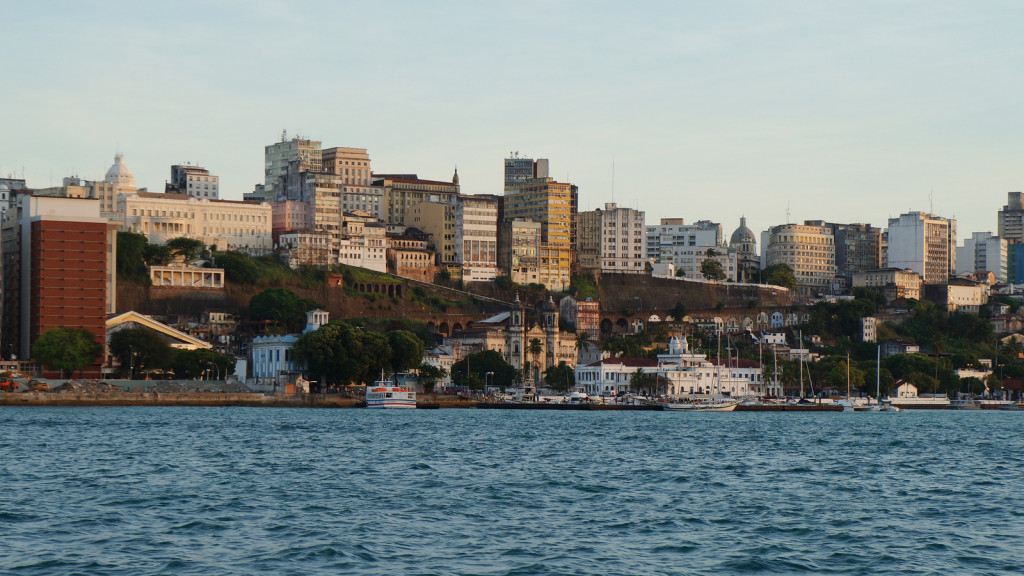
View of Salvador from the bay. Photo © Leandro Neumann Ciuffo, licensed Creative Commons Attribution.
An alternative to finding a formal, full-time job in Brazil is to go the self-employed route, either by working as a freelancer (with clients in Brazil—or North America—or both) or by starting your own business. To start your own business in Brazil, or to invest in a new or preexisting company, involves applying for—and being granted—an Investment Visa, which you can read more about in the Making the Move chapter of Moon Living Abroad in Brazil.Good sources of information for investors and entrepreneurs alike are Rio Negócios and Investe São Paulo, business development agencies that focus on helping foreign businesspeople find investment and start-up opportunities in Rio and São Paulo. The national equivalent, BrasilGlobalNet provides a breakdown of trade and investment opportunities available in all the Brazilian states.
Despite an attractive economy and expanding consumer markets (both physical and virtual), as well as untapped potential and lack of competition in many areas, starting a business in Brazil is not for the faint of heart. According to the IBGE (Brazilian Institute of Geography and Statistics), 4 out of 10 new companies close their doors after their first two years in business. And according to the World Bank’s 2012 Doing Business report, which examines issues such as the ease of starting a business, dealing with construction permits, registering property, and paying taxes, Brazil is still one of the worst counties in the world for a foreigner to start a business, ranking 126th out of 183 countries.
Major obstacles include high tax rates and swollen bureaucracy. For instance, the World Bank report found that it takes an average of 13 procedures and 119 days of work just to start a business, which can involve getting approval from a dozen different government agencies and laying out R$2,000 just for shuffling paperwork. Construction permits alone involve an average of 17 procedures and 469 days before they are finally authorized. Navigating the thick tangle of rules and regulations is impossible without a lawyer, not to mention an accounting specialist. Complicating matters further is the fact that such baroque bureaucracy lends itself easily to corruption. Using bribes as a means to speed up the issuing of a document is quite common.
In many cases, it’s almost impossible to start a business in Brazil without an experienced Brazilian partner who speaks the language, understands the culture (specifically when it comes to dealing with employees), and can navigate the stormy seas of bureaucracy.Another consideration is finding the right business partner. In many cases, it’s almost impossible to start a business in Brazil without an experienced Brazilian partner who speaks the language, understands the culture (specifically when it comes to dealing with employees), and can navigate the stormy seas of bureaucracy. Such an associate has to be someone you can trust (there are legion stories of naïve gringos who were fleeced or scammed by Brazilian partners) and someone who shares your goals and a certain mindset (Brazilians in business tend to be more prone to improvising than planning and focusing on the short term as opposed to the long term). If you decide to fly solo—a possibility in cases such as opening a pousada, for example—you’ll definitely need to rely on an experienced Brazilian lawyer and business consultant.A lot of expat businesspeople also have problems when it comes to dealing with employees. Brazilians have a tradition of changing jobs frequently, especially these days with the shortage of professionals and specialized workers. This stems from a tradition in which a successful career is more about money than loyalty to a company or brand. In many cases, notions such as taking initiative, motivation, teamwork, and “the customer is king” are fairly alien to Brazilian employees. Meanwhile, lateness and absenteeism are common.
Such attitudes are understandable when one considers the way many employers have traditionally treated—and continue to treat—workers in Brazil. Many are exploited, woefully underpaid, and obliged to work under very difficult conditions (i.e., construction workers with no protective gear whatsoever who are exposed to hazardous situations and toxic substances; maids who work seven days a week and receive far less than minimum wage). Because of the many abuses against workers, labor laws in Brazil are heavily skewed toward protecting employees. While positive in theory, in practice this can create complications: Even when employees give just cause to be fired, it’s often very difficult to dismiss them. Moreover, employees can (and do) often sue employers for wrongful termination. In fact, Brazil has one of the highest number of labor claims in the world.
Excerpted from the First Edition of Moon Living Abroad in Brazil.